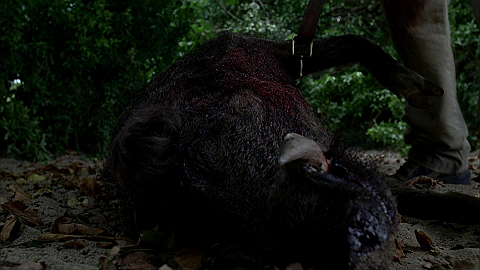Lost Exegesis (Walkabout)
 So I guess we were right, back in the Tabula Rasa entry, about Locke’s first name being John, an invocation of the historical John Locke. We must be, like, psychic or something.
So I guess we were right, back in the Tabula Rasa entry, about Locke’s first name being John, an invocation of the historical John Locke. We must be, like, psychic or something.
A brief history, then. John Locke was a very privileged white man, born in 1632, England. He went to Oxford, studied with such famous scientists as Newton and Boyle, and determined to become a doctor. By 1666, Locke had teamed up with Dr. David Thomas to run a laboratory, probably a pharmacy. Through Thomas, Locke met Lord Anthony Cooper (one of the richest men in England and later the Earl of Shaftesbury) and became his personal physician. Lord Ashley also helped secure a government job for Locke, and for the next ten years or so Locke lived at Lord Ashley’s estate. Locke eventually went back to Oxford and received a Bachelor of Medicine and a license to practice.
But Locke isn’t primarily known as a physician so much as a philosopher, indeed a founder of liberalism. Mind you, we’re talking about the 17th Century. Locke isn’t a “leftist” in the modern sense of the term. Rather, his philosophy forms part of the bedrock of capitalism, from his early theories on prices, money, unlimited accumulation, and a theory of government oriented around the protection of private property versus one that is motivated by, say, compassion. Much of this philosophy is rooted in his conception of our “state of nature”:
“To understand political power right, and derive it from the original, we must consider, what state all men are naturally in, and that is, a state of perfect freedom to order their actions, and dispose of their possessions and persons, as they think fit, within the bounds of the law of nature, without asking leave, or depending upon the will of any other man.”
— John Locke, Second Treatise
So it’s amazingly prescient, given the state of pigfuckery today that LOST’s Locke ends up bringing home a boar. But on the Island, John Locke is not presented as a literal embodiment of the historical figure, despite his constant admonishment, “Don’t tell me what I can’t do!” On the contrast, he’s a frustrated man who has experienced a kind of rebirth, a literal “ascension” given the miraculous restoration of his legs.
Hence the Opening Eye motif at the beginning of the episode.
 As mentioned in the exegesis of Pilot Part 1, the Opening Eye is fraught with symbolism. An awakening, becoming aware of an inner truth, a spiritual revelation. Even a resurrection. But Locke’s eye isn’t meant to be “read” in the same way as Jack’s. Locke’s right eye (or, rather, “eye”) is bifurcated by a scar running vertically down “across” is center. His insight, then is “crossed” with Jack’s.
As mentioned in the exegesis of Pilot Part 1, the Opening Eye is fraught with symbolism. An awakening, becoming aware of an inner truth, a spiritual revelation. Even a resurrection. But Locke’s eye isn’t meant to be “read” in the same way as Jack’s. Locke’s right eye (or, rather, “eye”) is bifurcated by a scar running vertically down “across” is center. His insight, then is “crossed” with Jack’s.
In one sense, we could say Locke’s resurrection is exteriorized as opposed to interiorized. His body has been reborn. He can walk. But is just as angry and self-oriented as before the crash, as evidenced by his casual dismissal of Michael’s injury in favor of his own self-aggrandizement in pursuing the boar.…
